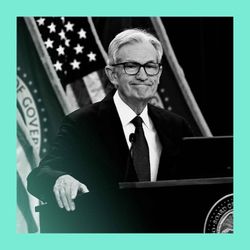Share

Money Talks from The Economist
Money Talks: What happens if inflation sticks?
Over the past two years, inflation has been full of surprises. Central bankers are now facing up to the very real possibility that bringing sticky inflation down to their 2% targets could bring deep economic pain. Some analysts are starting to ask whether they might be tempted to tolerate higher inflation instead.
On this week’s podcast, hosts Alice Fulwood, Tom Lee-Devlin and Mike Bird ask what would happen if ballooning price rises aren’t brought back down to target. The Economist’s Josh Roberts tells them why higher inflation may be here to stay. And Ed Cole, from asset manager Man Group, and Andrew Balls, from PIMCO, explain what would happen in equities and bond markets if it does.
Sign up for our new weekly newsletter dissecting the big themes in markets, business and the economy at www.economist.com/moneytalks
For full access to print, digital and audio editions, subscribe to The Economist at www.economist.com/podcastoffer
More episodes
View all episodes

Japan’s election: why investors are worried
35:59|Japan’s prime minister looks set for a big victory in this week’s snap election. In a bid to address Japan’s prolonged stagnation and rising cost of living, Takaichi Sanae has promised tax cuts and high government spending. How could her plans reshape the economy—and why have they rattled global markets?Hosts: Ethan Wu, Mike Bird and Alice Fulwood. Guest: Tobias Harris, founder of Japan Foresight.Transcripts of our podcasts are available via economist.com/podcasts.Listen to what matters most, from global politics and business to science and technology—subscribe to Economist Podcasts+.For more information about how to access Economist Podcasts+, please visit our FAQs page or watch our video explaining how to link your account.
‘Sell America’: is US market supremacy under threat?
29:20|From assaults on Federal Reserve independence to his threats to seize Greenland, the first year of Donald Trump’s second stint in the White House has been head-spinning. But so far, one cohort at least appears unfazed: investors. The S&P 500 has risen 15% over the past 12 months and hit yet another all-time high on January 27th. So what, if anything, would it take for investors to “sell America”?Hosts: Mike Bird, Alice Fulwood and Ethan Wu. Guest: Marko Papic from BCA Research.Transcripts of our podcasts are available via economist.com/podcasts.Listen to what matters most, from global politics and business to science and technology—subscribe to Economist Podcasts+.For more information about how to access Economist Podcasts+, please visit our FAQs page or watch our video explaining how to link your account.
Trailer: Boss Class Season 3
02:18|AI is changing how we work. It's turning us all into managers. Be a good one.The Economist’s management columnist, Andrew Palmer, takes on the bots in the third season of Boss Class. From cloning to coding, agents to entry-level jobs, he tackles the threat head on and figures out how to turn anxiety into opportunity. Along the way he meets bulls and bears and the people who can help you to master management in the age of AI.Full Season 3 out 29th January 2026.To listen to the full series, subscribe to Economist Podcasts+.https://subscribenow.economist.com/podcasts-plusIf you’re already a subscriber to The Economist, you have full access to all our shows as part of your subscription. For more information about how to access Economist Podcasts+, please visit our FAQs page or watch our video explaining how to link your account.
When AI gets physical: a peek inside the factories of the future
39:22|“The ChatGPT moment for robotics is here,” Nvidia boss Jensen Huang said earlier this month. And nowhere is that more obvious than on the factory floor, where machines aren’t just becoming more agile, but smarter, too. This week, Money Talks takes a trip to Germany, to tour the factories of the future.Hosts: Ethan Wu and Alice Fulwood. Guest: Anjani Trivedi, The Economist’s global business correspondent.Transcripts of our podcasts are available via economist.com/podcasts.Listen to what matters most, from global politics and business to science and technology—subscribe to Economist Podcasts+.For more information about how to access Economist Podcasts+, please visit our FAQs page or watch our video explaining how to link your account.
Powell move: how Trump’s Fed fight could backfire
32:23|Donald Trump’s administration has gone to war with the Federal Reserve. His justice department has issued subpoenas to the Fed. But chair Jerome Powell says they have nothing to do with alleged wrongdoing and everything to do with pressuring him to cut rates. Around the world, central bankers have come to Powell’s defence and, at home, even Republican lawmakers have called for the Trump administration to back down. So has Trump’s latest offensive against the Fed just backfired?Hosts: Mike Bird and Alice Fulwood. Guest: Alan Blinder, former vice chair of the Federal ReserveTranscripts of our podcasts are available via economist.com/podcasts.Listen to what matters most, from global politics and business to science and technology—subscribe to Economist Podcasts+.For more information about how to access Economist Podcasts+, please visit our FAQs page or watch our video explaining how to link your account.
Oil or nothing: will Trump’s Venezuela gamble pay off?
35:32|Donald Trump had oil on his mind when he declared America would “run” Venezuela, in the wake of an audacious US mission to capture the country’s dictator Nicolás Maduro. But while Venezuela holds the world's largest proven oil reserves, extracting a profit for US firms may be harder than President Trump thinks.Hosts: Ethan Wu and Mike Bird. Guest: Vijay Vaitheeswaran, The Economist’s global energy and climate innovation editor.Transcripts of our podcasts are available via economist.com/podcasts.Listen to what matters most, from global politics and business to science and technology—subscribe to Economist Podcasts+.For more information about how to access Economist Podcasts+, please visit our FAQs page or watch our video explaining how to link your account.
Poverty of notions: is Adam Smith overrated?
32:37|250 years after the publication of “The Wealth of Nations”, Adam Smith remains a towering figure in economics. But could the field’s most famous book be less revolutionary than you might think? Mr Smith is cited as an influence on politicians from Margaret Thatcher to Javier Milei, but he’s also been widely misrepresented and credited with ideas that were not his own. So is he really the “father of economics”, or is his influence overstated?Hosts: Mike Bird and Alice Fulwood. Guest: The Economist’s senior economics writer Callum Williams.Transcripts of our podcasts are available via economist.com/podcasts.Listen to what matters most, from global politics and business to science and technology—subscribe to Economist Podcasts+.For more information about how to access Economist Podcasts+, please visit our FAQs page or watch our video explaining how to link your account.
Money Trivia: our annual Christmas quiz
27:02|Break out the mulled wine—it’s the most wonderful (and competitive) time of the year. The Money Talks hosts return with their annual festive quiz. Can you beat Alice, Ethan and Mike at their own game?Hosts: Mike Bird, Ethan Wu and Alice Fulwood.Transcripts of our podcasts are available via economist.com/podcasts.Listen to what matters most, from global politics and business to science and technology—subscribe to Economist Podcasts+.For more information about how to access Economist Podcasts+, please visit our FAQs page or watch our video explaining how to link your account.
Tinseltown tussle: the battle for Warner Brothers
30:47|The bidding war for Warner Brothers has become an instant blockbuster. Netflix’s $83bn deal to buy the storied studio seemed all but done when David Ellison, the son of tech billionaire Larry Ellison and the owner of Paramount Skydance, rode in with a rival offer. Who wins will shape the future of Hollywood.Hosts: Ethan Wu and Alice Fulwood. Guest: The Economist’s media editor Tom Wainwright. Transcripts of our podcasts are available via economist.com/podcasts.Listen to what matters most, from global politics and business to science and technology—subscribe to Economist Podcasts+.For more information about how to access Economist Podcasts+, please visit our FAQs page or watch our video explaining how to link your account.